YSB programs are designed to meet the needs of youth and families in Monroe County and its surrounding communities, a goal which requires a wide variety of programs and services. To fulfill this goal, YSB has developed a program based on four major components, which are described below. YSB also maintains partnerships with other agencies to provide services related to the four components listed below and to ensure effective and efficient use of available community resources.
Binkley House Emergency Youth Shelter Services
The Binkley House Youth Shelter is the largest division of YSB, and provides short-term residential care and crisis intervention for youth ages 10-17. The shelter provides emergency shelter for runaways, homeless youth, and youth in crisis or abusive situations at home. The shelter is a Basic Center Program.
Accessible 24 hours a day, Binkley House provides services such as counseling, education, supervised recreation, transportation to and from school and other appointments, and referrals to a variety of agencies for related services.
YSB also assists with transitional services during a youth's stay at the Binkley House Emergency Youth Shelter. These include independent living, transition to long-term residential care, transition from long-term residential care back home, and long-term aftercare counseling. The youth shelter also serves as a respite resource for youth placed in foster homes to minimize foster care repeat placements. The Youth Services Bureau of Monroe County does not charge a fee for the services provided for Safe Place or parental admissions. We are recipients of The Federal Runaway and Homeless Youth Grant and our emergency Shelter is a Basic Center Program.
Referrals to the youth shelter can be made by other social service agencies, parents, or by the youth themselves.
Homebased Counseling
YSB provides intensive home-based counseling at no cost to families at risk of abuse or neglect, or youth at risk of running away. Whenever feasible, maintaining the family unit as a functional entity is our goal. Family preservation is always the preferred outcome.
In addition to crisis counseling services, the Youth Services Bureau operates Safe Place of Monroe, Greene, and Owen Counties, a community-wide outreach service for runaways and at-risk youth in crisis situations. Throughout Monroe, Greene, and Owen Counties, dozens of businesses and community locations have volunteered to be part of the Safe Place Network. These Safe Places are identified by the bright yellow Safe Place sign. A youth can enter a Safe Place at any time and ask for help. Within a few minutes a trained volunteer arrives to meet the youth and assist in defusing the crisis. In some cases, the youth chooses to have the volunteer transport them to the Youth Services Bureau shelter where staff welcome the youth and provide for his or her immediate needs--food, warmth, rest, etc. Together they begin to work toward a solution.
Click here for more information about the Safe Place program.
Prevention
Building a Thriving Compassionate Community:
In April 2015, Building a Thriving Compassionate Community (BTCC) started as a small group of passionate individuals talking about the effects of trauma in Monroe County, Indiana. We wanted to create common language around trauma and trauma-sensitive practices and help connect existing resources and initiatives to be more effective and responsive. Within the first few months of convening, BTCC began to shift attention and focus to understanding how trauma could be prevented in the first place – how trajectories for children, families, neighborhoods, and communities could be improved if we could assure safe, stable, and nurturing relationships and environments from the start. With the sub-committee efforts growing and requiring more infrastructure and support, ABC members decided in 2017 to move their sub-committee initiatives under the umbrella of the Youth Services Bureau of Monroe County (YSB).
Monroe County Youth Council:
MCYC is a youth-led organization that invites Monroe County high school teens – including those who have not previously had opportunities for leadership – to learn what it takes to make a difference in their community.
Bloomington AfterSchool Network:
The Bloomington AfterSchool Network is a coalition that strives to connect Monroe County after school programs, schools, and organizations that impact and serve youth in our community.
YSB also maintains partnerships with other agencies to provide services related to the four components listed above and to ensure effective and efficient use of available community resources.
Food Safety Quick Links

Food Manager/Handler Education |
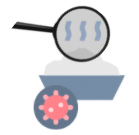
Foodborne Illness &
Complaint Investigations |

Guidance Documents for Food Establishments
|

Mobile Food
Licensing |

Retail Food
Establishment Licensing |

Temporary and Seasonal
Food Licensing
|

Applications
|
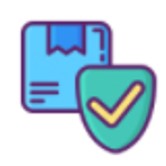
Inspection Reports
|
Food Establishment Inspections
At the present time, our inspection reports prior to December 2022 are not electronic and therefore are NOT available online. However, you may request information on a retail food establishment by completing the Public Records Request Form.
To ensure compliance with State and Local Laws, the Food Protection Staff inspect each facility on a frequency based on a risk analysis of the establishment, the type of menu offered for sale, and the type of population served.
Critical violations are defined as those that are likely to directly contribute to a foodborne disease. The most common and most dangerous critical violations are various degrees of temperature abuse. Potentially hazardous foods must be kept at or above 135º F or at or below 41º F. Failure to do so, or failure to cook food to the proper temperature or cool cooked food quickly (within 6 hours) to below 41ºF, is the leading cause of foodborne illness.
Non-critical violations are those that have contributing factors, but are generally not the primary cause of an outbreak.
Please contact one of our Food Environmental Health Specialists for more information: ehsfoods@co.monroe.in.us or by phone: 812-349-2543, option 4. Office hours for staff are normally 8am to 9:30am Monday through Friday for walk-ins. We urge you to make an appointment prior to walking in as staff may be out of the office doing field work.
Through this website you are able to link to other websites which are not under the control of the Monroe County Health Department. We have no control over the nature, content and availability of those sites. The inclusion of any links does not necessarily imply a recommendation or endorse the views expressed within them, they are for informational purposes only.
Wastewater Sanitation Quick Links
Members of the Monroe County Health Department Wastewater Section advise, inspect and approve the installation of septic systems in Monroe County.

Information provided to show progress in process improvement for the EHS-Wastewater section. This chart will be updated periodically.
An Application for a Septic Permit must be submitted when a system needs to be installed, repaired or replaced.
How do I complete a Septic Permit application?
1.)Visit OpenGov to request for services/access applications.
Click the picture below to watch how to navigate OpenGov:
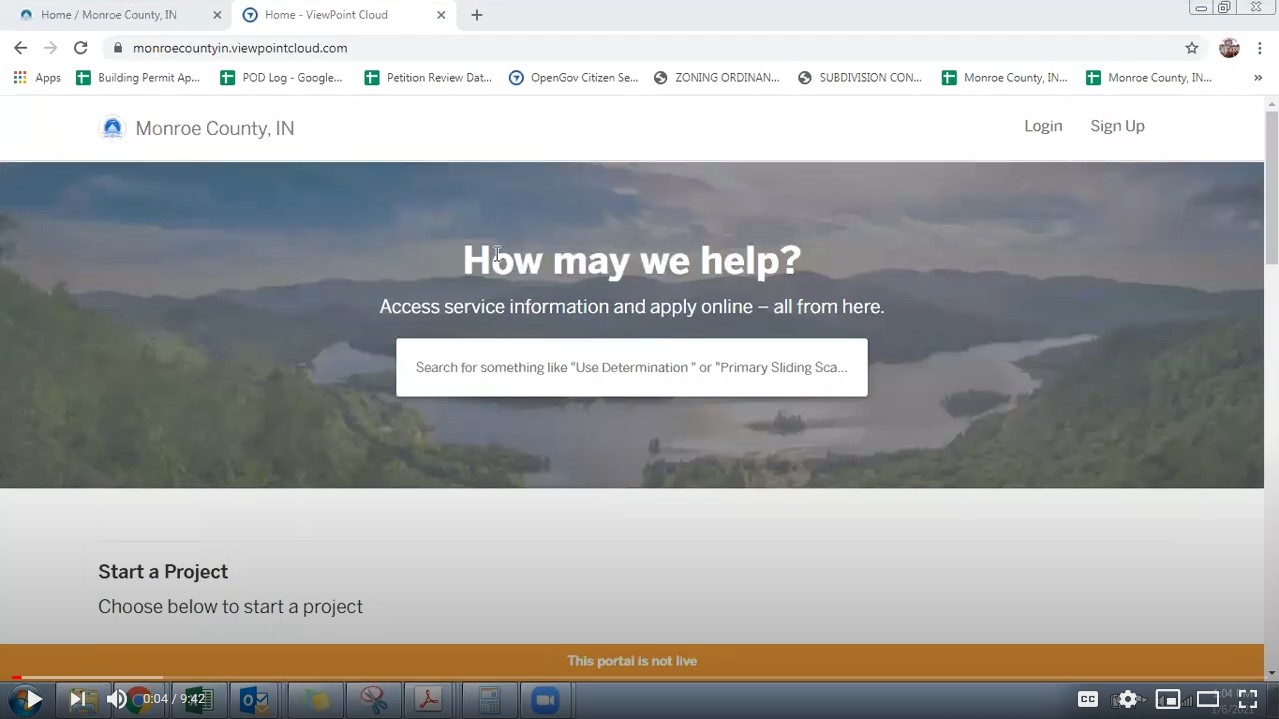
If you are unable to use the online permitting system, OpenGov, paper applications are available upon request.
2.) Payment can be done in person (in the Health Department), through mail, or over the phone (812) 349-2542. NOTE: Payment CANNOT be done through OpenGov.
Septic Fees for Services
| New Septic Permit |
$250 |
| Reinstatement of new permit |
$100 |
| Repair Septic Permit |
$150 |
Commercial Septic Permit (new or repair)
|
$400 |
| Real Estate Inspection |
$100 |
Septic Installer Test and Company Registration
|
$150 |
*Must provide proof of insurance*
|
|
Septic Installed by Homeowner Test Fee
|
$250 |
*Fees are subject to change
Please contact one of our Wastewater Specialists for more information at wastewater@co.monroe.in.us or by phone: 812-349-2543, option 3. Office hours for staff are normally 8am-9am Monday through Friday for walk-ins. We urge you to make an appointment prior to walking in as staff may be out of the office doing field work.
Through this website you are able to link to other websites which are not under the control of the Monroe County Health Department. We have no control over the nature, content and availability of those sites. The inclusion of any links does not necessarily imply a recommendation or endorse the views expressed within them, they are for informational purposes only.
RUN, HIDE, FIGHT: What to do when an active shooter is in your vicinity:
RUN
- Have an escape route and plan in mind (Practice this so that you are ready to go in an emergency)
- Leave your belongings behind (grab your cell phone if you can)
- Keep your hands visible
HIDE
- Hide in an area out of the shooter's view
- Block the entry to your hiding place, lock the door and turn out the lights
- Silence your cell phone
FIGHT
- As a last resort and only when your life is in danger
- Attempt to incapacitate the shooter
- Act with physical aggression, use whatever items are available
How should I respond when law enforcement arrives?
- Remain calm and follow instructions
- Put down any items you have in your hands
- Raise your hands and keep them visible
- Avoid quick movements toward officers
- Avoid pointing and screaming
- Do not stop until you are evacuated to a safe area
If you are able to safely call 911
- Give the location of the active shooter
- Give the number of shooters
- Give a physical description of the shooter(s)
- Give a description of the number and type of weapons being used
- Give the approximate number of persons present at your location
Check out the Run, Hide, Fight video to increase your knowledge
Request Records Electronically!
In an effort to continuously improve services to the citizens of our county, we have launched an Electronic Request Processing Solution.
You can request services from us by using our website, entering your request on a kiosk in our office, or visit and interact with staff. Irrespective of your type of request, we provide a transaction reference ID, and provide automatic communications. This new system will make us efficient, responsive to citizen requests, and state of the art by implementing a best practices packaged solution. To submit a request select the appropriate form, fill in all of the information and submit. You will be automatically notified of the progress via e-mails; or you can check the status by clicking on the "Track Your Request" button & putting in your Transaction ID number.
To make a suggestion, ask a question, or let us know about a problem, select the Online Request Form & submit.
To print a hard copy form to fill in, and mail, fax, or bring in to the office, please click the Document Center link & select & click on appropriate form.
Please feel free to use one of our public access computers available in the front lobby area of the Monroe County Clerk’s Office.
The Clerk’s Office requires requests to view files be submitted at least 24 hours in advance. Any request received prior to 2 pm should be available at least within 72 hours (with the exception of weekends or holidays).
Environmental Health Quick Links
Environmental Health: General
Environmental health is the science and practice of preventing human injury and illness and promoting well-being by (1) identifying and evaluating environmental sources and hazardous agents and (2) limiting exposures to hazardous physical, chemical and biological agents in air, water, soil, food, and other environmental media or settings that may adversely affect human health.
The Monroe County Health Department has two Environmental Health Specialists who are responsible for the enforcement and compliance with environmental health laws, rules and regulations in Monroe County. They inspect and investigate environmental health concerns, including reviewing and issuing permits, investigating facilities, collecting and testing environmental samples and referring cases to law enforcement agencies as required.
IDEM - What's In My Neighborhood
Since IDEM was formed in 1986, the agency has been aggressively searching for and cleaning up contaminated properties. The following link offers Hoosiers several ways to access a wide variety of environmental information about your community.
Please contact one of our General Environmental Health Specialists for more information: ehsgeneral@co.monroe.in.us or by phone: 812-349-2543, option 5. Office hours for staff are normally 8am to 9:30am Monday through Friday for walk-ins. We urge you to make an appointment prior to walking in as staff may be out of the office doing field work.
Through this website you are able to link to other websites which are not under the control of the Monroe County Health Department. We have no control over the nature, content and availability of those sites. The inclusion of any links does not necessarily imply a recommendation or endorse the views expressed within them, they are for informational purposes only.
Monroe County 2025 Budget
The 2025 Monroe County Budget has been approved and is linked below.
Monroe County 2025 Final Budget: Ordinance 2024-49.
Brief Introduction to the County Budget Process:
How do we get from here to there?
While the local government budget process provides opportunities for public input on proposed budgets, the process can seem challenging, particularly to members of the public who may not be experienced in working with County government. The purpose of this guide is to provide members of the public with a brief overview of the County’s budget process in plain language.
The process begins with budget requests made by each department in Monroe County Government covering the entire fiscal year. Council will also review budget requests from the Monroe Fire Protection District and the Monroe County Solid Waste Management District.
Then each budget request will go through the following steps to final approval:
Budget Work Sessions: The County Council will hold five (5) budget work sessions to discuss each department's budget proposals with the department heads who submitted them. During these work sessions, the County Council may increase, decrease, or leave budget proposals unchanged. These dates of these meetings will be noticed to the media in advance.
Advertisement: After the budget work sessions, the revised budget - now called the "proposed" budget, along with proposed property tax rates and levies, will be noticed to the public via Gateway.
Public Hearing: During the hearing, members of the public are invited to comment about the advertised budget. County Council members may also discuss the budget and vote on changes at this meeting, again, at this point, only decreases to the proposed budget maybe considered.
Budget Adoption:
The County Council adopts the Monroe County Budget over two days: The Council will read the budget and property tax levies into the record on for the "First Reading". The Council may also discuss the budget at this point, and proposed changes. Approximately one week late, Council will read the budget and property tax levies again into the record for the "Final Reading" then discuss, and take a final vote on the entire budget and property tax levies and rates, not on individual budgets or lines.
Monroe County Budget Reports, both past and present, can be found on Gateway at this link: Budget Summary Report
Prior Year Budget Links:
Vital Records
The Vital Records Division provides birth and death certificates for Monroe County, Indiana from 1882 to present year. In some cases, we may be able to provide records from other counties in Indiana. Please contact our office or visit us for more information.
Vital Records Quick Links
You will find the Certificate Applications above. They are required by the Monroe County Health Department.
Most transactions take approximately 5 minutes in person. Affidavits and home birth registration can take up to 30 minutes, sometimes longer. We ask that you please make an appointment for these services.
Vital Records Fees:
Birth Certificates (appointment is not required for this service) - $16.00 per certificate; you will receive a standard size. Identification is required.
Death Certificates - $16.00 per copy; identification and proof of relationship / vested interest is required; corrections to death certificates must be made by the funeral home that provided the services.
- Please contact the funeral home you are working with directly for any delay in receiving death certificates.
Affidavit Requesting Amendment (appointment is required for this service) - $53.00; identification and two documents 10+ years old showing correct information are required. For children 3 - 17 years old, please call for assistance.
Certified Copy of Paternity Affidavit on file - $10.00 per copy; identification is required.
Correction Notification - $10.00; for children two years of age and younger only; both parent's signatures are required.
Home Birth Registration (appointment is required for this service) - $53.00; Please call or email vitalrecords@co.monroe.in.us for instructions and to make an appointment.
Paternity Affidavit (appointment is required for this service) - $53.00; must file in office with both parents present; identification is required.
Paternity Affidavit Upon Marriage (appointment is required for this service) - $53.00; must file in office with both parents present; identification and a certified copy of the marriage license are required, along with the mother's divorce decree if applicable.
**Note: Some of the above documents may require an additional notary fee of $2.00 per document.**
*Prices are subject to change.
Identification
Due to increased identity theft and fraudulent use of documents, in order to obtain a Birth and/or Death Certificate, you will need specific documentation at the time of issuance. Click for an updated list of accepted documentation.**Paper/Temporary copies of driver's licenses will not be accepted**
Payment
We accept cash, money order, checks and most major credit cards. If paying by check, you must provide the check writer's valid driver's license or state issued identification card. Please note, there is a convenience fee to use credit/debit cards: a minimum of $1.35 or 2.25% of the transaction.
If mailing your request, send the completed application, fee and photocopies of accepted documentation to the following address:
Monroe County Health Department
Attn: Vital Records Staff
119 W. 7th Street
Bloomington, IN 47404
Most requests received through the mail are processed on the day received.
Monroe County Health Department does not accept online orders; however, for your convenience, you can process online requests through an independent company that we have partnered with to provide you this service - VitalChek Network Inc. VitalChek can be reached through its website www.vitalchek.com. An additional fee is charged by VitalChek for using this service, and all major credit cards are accepted, including American Express®, Discover®, MasterCard®, or Visa®.
Other internet vendors are not authorized by the Monroe County Health Department and may charge additional fees without providing state-approved services. Neither Monroe County nor VitalChek have control over the services and fees other internet vendors offer and charge, nor can we guarantee the confidentiality of any vital record data provided to vendors other than VitalChek.
Through this website you are able to link to other websites which are not under the control of the Monroe County Health Department. We have no control over the nature, content and availability of those sites. The inclusion of any links does not necessarily imply a recommendation or endorse the views expressed within them, they are for informational purposes only.
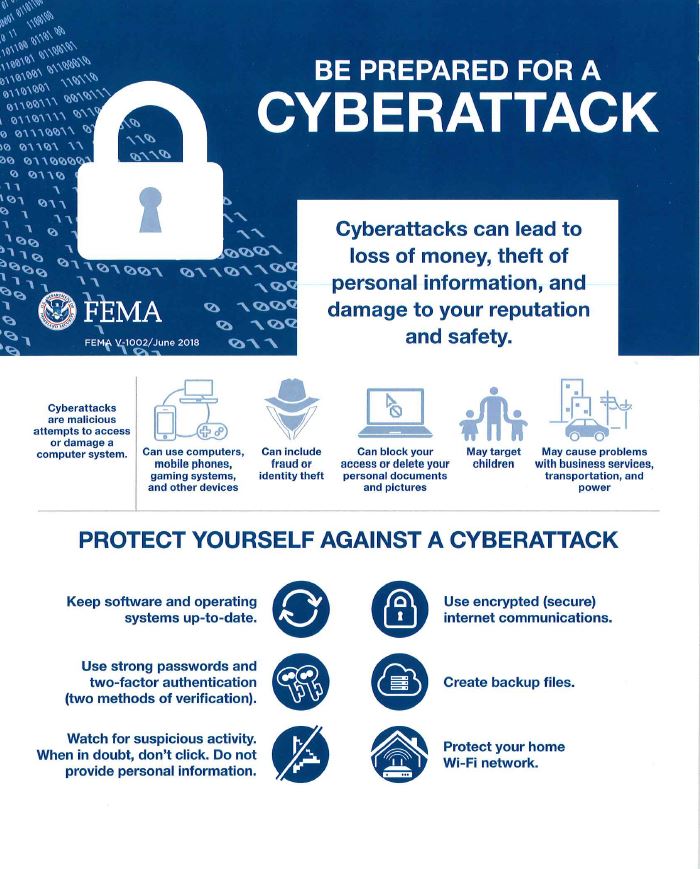
Population Health and Outreach
|
Health Educators are key in ensuring the many Community Health programs at Monroe County Health Department are able to support the health and well-being of community members who live, work and play in Monroe County.
What is it that health educators do?
- Assess needs, resources, and capacity for health education/promotion
- Plan and implement health education/promotion
- Conduct evaluation and research related to health education/promotion
- Administer and manage health education/promotion
- Serve as a health education/promotion resource person
- Communicate, promote, and advocate for health, health education/promotion, and the profession
Any given day you may find one of the Monroe County Health Department's health education professionals out in the community working directly with program participants, engaging with community stakeholders, providing training, or collecting and analyzing data to better understand the health related trends in Monroe County. To learn more about the programs and projects in the Community Health Education department, please click on the links at the top of the page.
|
Community Health Tips
Through this website, you are able to link to other websites which are not under the control of the Monroe County Health Department. We have no control over the nature, content, and availability of those sites. The inclusion of any links does not necessarily imply a recommendation or endorse the views expressed within them, they are for informational purposes only.
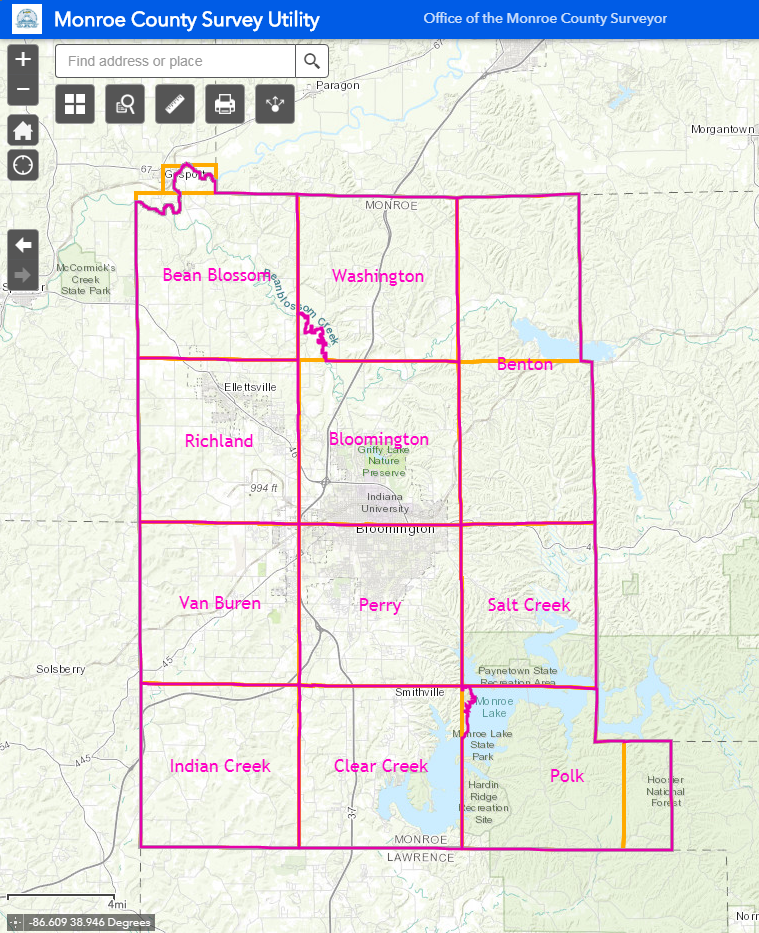
IC 36-2-12-11 requires the county surveyor to keep and maintain a record and an index by location of all the original government survey corners containing the location of the corner, an accurate description of the monument, the distance and bearings from the corner to three or more permanent objects, the date the corner was last checked, the condition of the monument and references, the name of the county surveyor making the check, and the method of establishing or relocating the corner.
The county surveyor is required to check and reference at least five percent of the corners shown in the corner record book each year. The Monument Records for those corners that have been checked and referenced (or calculated, set and referenced if missing) can be accessed individually through the "more info" links in the Monroe County Survey Utility Interactive Map or by Township through our Internet Archive pages.
For information regarding corners that do not have Monument Records, please contact the Office of the Monroe County Surveyor.
Permits are required by the Monroe County Highway Department whenever working in county right of ways or on any county roads. Failing to obtain a permit will constitute a violation from the Highway Department with a possible fine. The Monroe County construction standards and specifications, as published by the Highway Department, must be met, and construction plans must be approved prior to the beginning of work.
Click link to apply for Highway Permits through OpenGov Online Permitting:
Click link for directions: https://www.youtube.com/watch?v=n6__C9rCKvY.
Please watch this quick YouTube video for directions on how to apply for a permit.
Monroe County Standards and Specifications
Monroe County Standard Drawings
INDOT Standard Drawings
Curb Ramps
Sidewalks
Manholes
Resources
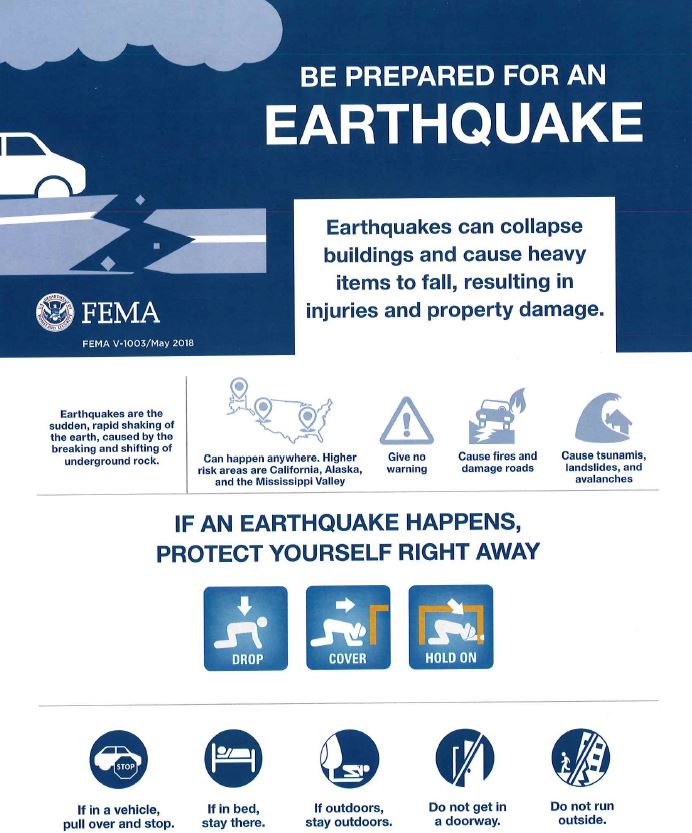
The Monroe County Street and Road Management Thoroughfare Plan and Capital Improvement Program was adopted by the Board of Commissioners of Monroe County, Indiana in December 1995 and amended in January of 1997. This plan was put in place to guide long term, comprehensive, road construction and maintenance activities within the unincorporated areas of Monroe County and to promote the health, safety, comfort and general welfare of the citizens of Monroe County, Indiana. The Master Thoroughfare Plan is a "planning" tool document. It is not specific to any project that is planned or envisioned.
The Public Works Department will present the plan to the Monroe County Commissioners for adoption in December 2018.
Note: The Capital Improvement Program (CIP) is updated through the Metropolitan Planning Organization (MPO) via the Transportation Improvement Program (TIP), and the Long Range Transportation Plan (LRTP). Click to view the Metropolitan Planning Organization.
Severe Weather Preparedness
BE WEATHER PREPARED
Severe weather can occur in Indiana at anytime throughout the year. It's important to be weather prepared to help protect yourself, your love ones, and your property from any weather event that may come our way. Monroe County can experience several different severe weather events.
Below are some ways to help yourself be better prepared:
- Have a safe place designated where you can seek shelter in the event that a tornado occurs. A basement or cellar is an ideal shelter. However, if not available, seek the most interior room (bathroom) in your house or apartment that is away from all doors and windows. If you live in a mobile home, seek a sturdy building near you, such as a nearby building or business, ahead of the storm.
- On your way to seeking shelter, grab something that you can use to protect your face from debris (a hardcover book, blanket, pillow, etc.).
- Have several ways of receiving weather alerts and other emergency alerts. Please do not rely on only outdoor warning sirens or one alerting source for warnings.
Here are some local sources you can go to receive weather alerts:
- Monroe County Alert System (free system for residents): https://member.everbridge.net/1772417038942730/login
- Monroe County Sheriff's Department Mobile App
- FEMA Mobile App
- Several local news and weather stations can send out weather alerts. Look at their websites for information.
- Stay tuned to local radio stations.
- Tune into a NOAA Weather Radio
- Be ready and prepared for power outages. Have battery-powered flashlights and other lighting sources readily available. Have a backup for your oxygen tanks or extra oxygen on hand. Have a way to keep your medications cold.
- Check on others around you in a safe manner. Help them be weather aware.
- If possible, store vehicles, outdoor equipment, and other valuables inside a shelter of some kind to help protect them from wind or hail damage.
- If your property receives storm-related damage after a storm event, reach out to your local emergency management agency to report the damage.
Weather Radios
Contact our office for a free weather radio. Limited supply available. Batteries not included. Please be a Monroe County resident or business.
Ready.GOV
Ready.gov is a helpful resource for families, individuals, and businesses to use to help them become better prepared for emergencies and disasters of any size.
The website has helpful tips on what to do before, during, and after a disaster. It also offers customizable emergency plans that can be created for a household or workplace to help everyone understand what to do when a disaster occurs. These plans can help lower stress during a disaster, which could improve your decision-making and overall well-being.
Everything on this website is free and available to anyone.
Tornado Drills
The State of Indiana conducts an annual statewide tornado drill during the month of March during National Severe Weather Preparedness Week, which is sponsored by the National Weather Service. The purpose of this drill and Preparedness Week is to promote severe weather awareness and preparedness techniques for all civilians. Severe weather is a major threat to the lives and property of everyone around the world and should always be taken seriously!
In response to the statewide tornado drill, Monroe County Emergency Management will activate all of the countywide outdoor warning sirens and send out a test alert message through the Monroe County Alert System. This drill won't happen if there is any sign of inclement weather on the scheduled drill date.
Severe Weather Safety Myths
Myth #1: Any Building is Safe During a Tornado
Manufactured buildings often can’t stand up to the wind speed and pressure, and are not safe shelters during a tornado. Hoosiers living in mobile homes or similar structures should talk to friends, family or neighbors to find a safe shelter in advance.
Permanent structures are best for shelter during a tornado, especially if they have a basement. Interior, lower level rooms away from doors and windows can be an adequate backup plan.
Myth #2: Seek Shelter in an Underpass During Tornadoes
When traveling during a tornado, an underpass is one of the worst places to take shelter. Wind speeds can increase while flowing under the structure, and serious injuries can occur. Seek shelter in a permanent structure (even better if it has a basement), or find a low-laying area and lay down flat on the ground.
Myth #3: Open Windows Prior to Tornado Strike to Equalize Pressure Inside the House to Prevent it from Exploding
Opening windows does not help equalize pressure, and spending the time cracking those windows can use up valuable seconds needed to take shelter. When an alert sounds on television, phones or all hazard radios, seek shelter right away.
Myth #4: If outside in a thunderstorm, seek shelter under a tree to stay dry.
Most lightning deaths and injuries occur when people are caught outdoors. Seek shelter right away, preferably in a building or hard top automobile. Although injuries can occur to someone in a car if lightning strikes the vehicle, being inside a hard-topped vehicle is better than outside. If no shelter is available, crouch in a low area such as a ravine or valley and stay alert for flash floods.
Myth #5: There’s No Way to Prepare for Disasters
Taking steps now can make a big difference during an emergency. Making a plan, building an emergency kit and learning about common local risks can help increase safety. Visit the Indiana Department of Homeland Security site GetPrepared.IN.gov for more information and resources for severe weather and floods.
The Monroe County Health Department´s Harm Reduction program acts as an umbrella for services that support the health and well being of people who use drugs (PWUD) in the community. It aims to support community members using substances by providing tools and guidance to make ANY positive changes towards whatever recovery means to that person, which may include but is not limited to abstinence.
The focus of harm reduction services provided centers around acknowledging that substance use is a reality in Monroe County, and seeking to develop strategies to reduce associated harms for community members.
The Harm Reduction program in Monroe County provides a number of services aimed specifically at helping reduce disease transmission and other harms in the community related to substance use such as:
- HIV rapid antibody testing
- Hepatitis C (HCV) rapid antibody testing
- Referrals to HIV/HCV care coordination and treatment
- Referrals to PrEP (Pre-Exposure Prophylaxis) navigation
- Harm reduction/disease prevention supplies (including fentanyl/xylazine testing strips)
- Overdose Reversal Training
- Naloxone distribution
- Referrals to substance use and mental health treatment providers
- Referrals to healthcare and social service providers
- Monroe County Syringe Service Program (in partnership with Indiana Recovery Alliance)
- Information and materials about safe sharps cleanup/disposal
“Harm Reduction is a set of practical strategies and ideas aimed at reducing negative consequences associated with drug use. Harm reduction incorporates a spectrum of strategies from safer use, to managed use, to abstinence to meet drug users ‘where they’re at,’ addressing conditions of use along with the use itself.”
- The Harm Reduction Coalition
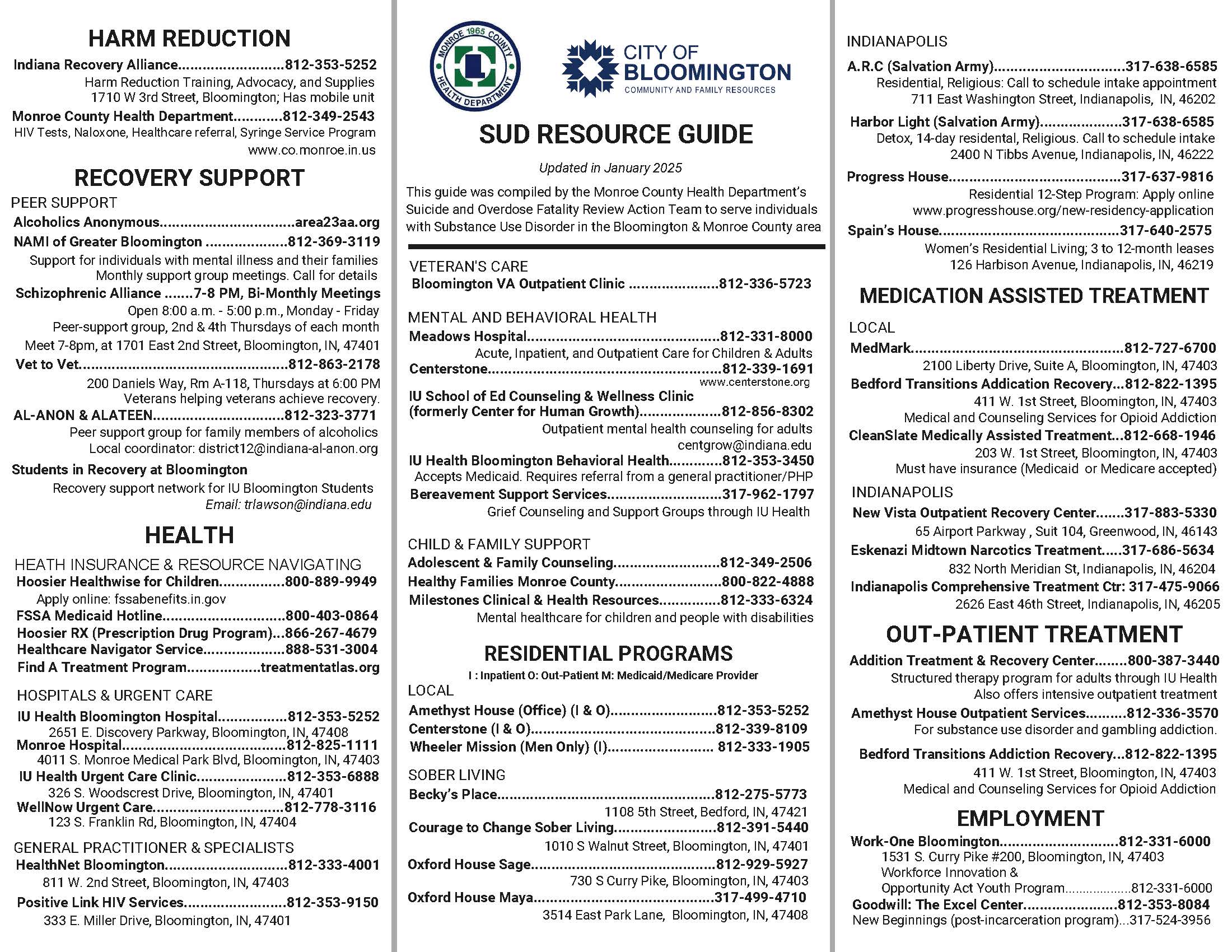
Through this website you are able to link to other websites which are not under the control of the Monroe County Health Department. We have no control over the nature, content and availability of those sites. The inclusion of any links does not necessarily imply a recommendation or endorse the views expressed within them, they are for informational purposes only.
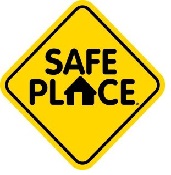 Safe Place
Safe Place
PLEASE NOTE: If you are seeking Safe Place Services, or are a youth in crisis, please contact the Binkley House Youth Shelter directly at 812-349-2507.
Safe Place Commercial
View a list of Safe Place sites in Monroe County, Greene County and Owen County.
Interactive Safe Place Web Map, Find the closest Safe Place to you!
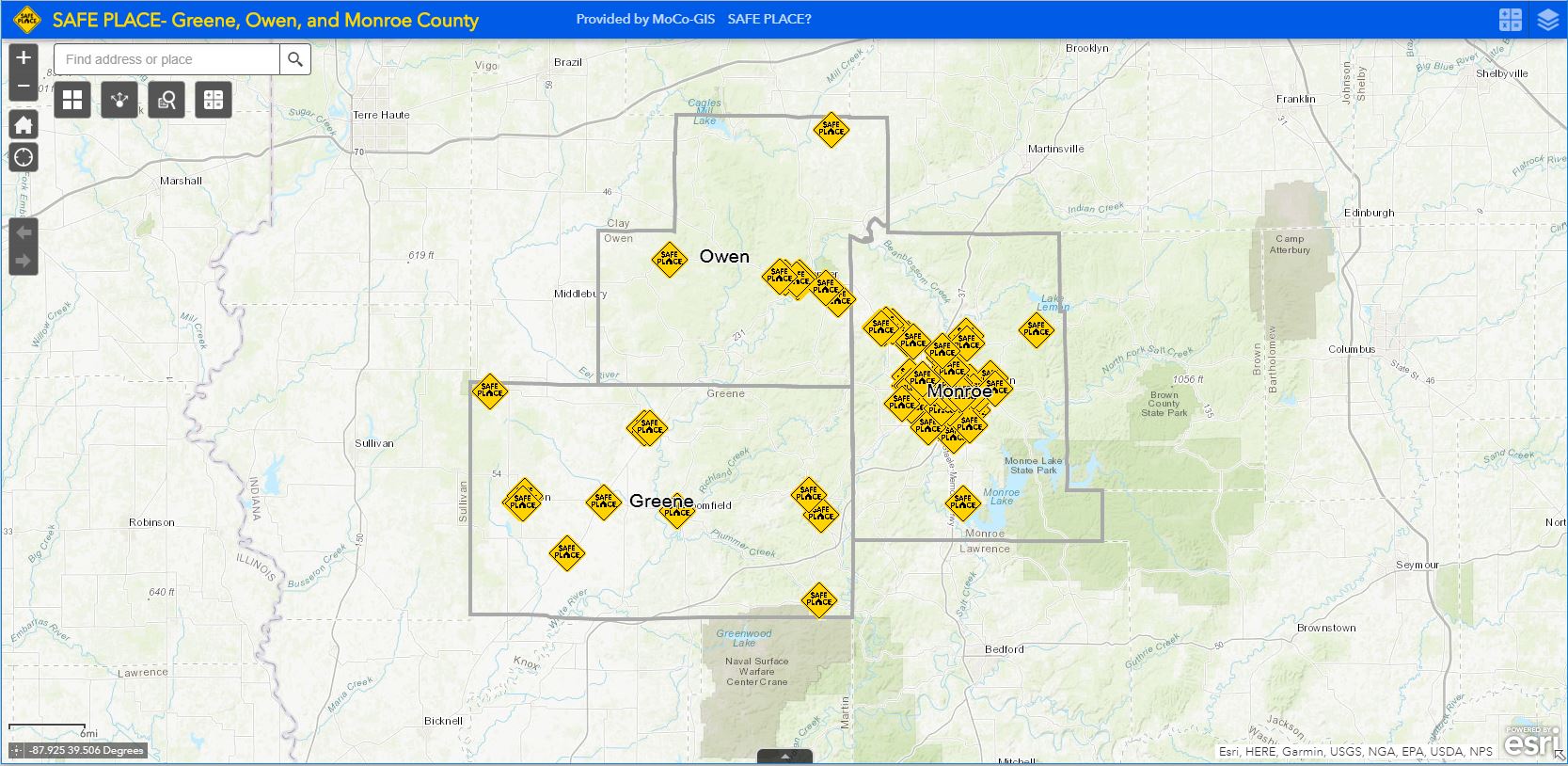
YSB knows that the best way to deal with a crisis is to prevent it.
In addition to crisis counseling services, the Youth Services Bureau operates Safe Place of Monroe, Greene, and Owen Counties, a community-wide outreach service for runaways and at-risk youth in crisis situations. Throughout Monroe, Greene, and Owen Counties, dozens of businesses and community locations have volunteered to be part of the Safe Place Network. These Safe Places are identified by the bright yellow Safe Place sign. A youth can enter a Safe Place at any time and ask for help. Within a few minutes a trained volunteer arrives to meet the youth and assist in defusing the crisis. In some cases, the youth chooses to have the volunteer transport them to the Youth Services Bureau shelter where staff welcome the youth and provide for his or her immediate needs--food, warmth, rest, etc. Together they begin to work toward a solution.
The National Safe Place vision is to make the Safe Place sign the universal symbol of help and safety for youth by working with local communities to build safety nets that can prevent vulnerable children and teens from victimization. To learn more information about National Safe Place, click the link below.
TXT 4 HELP
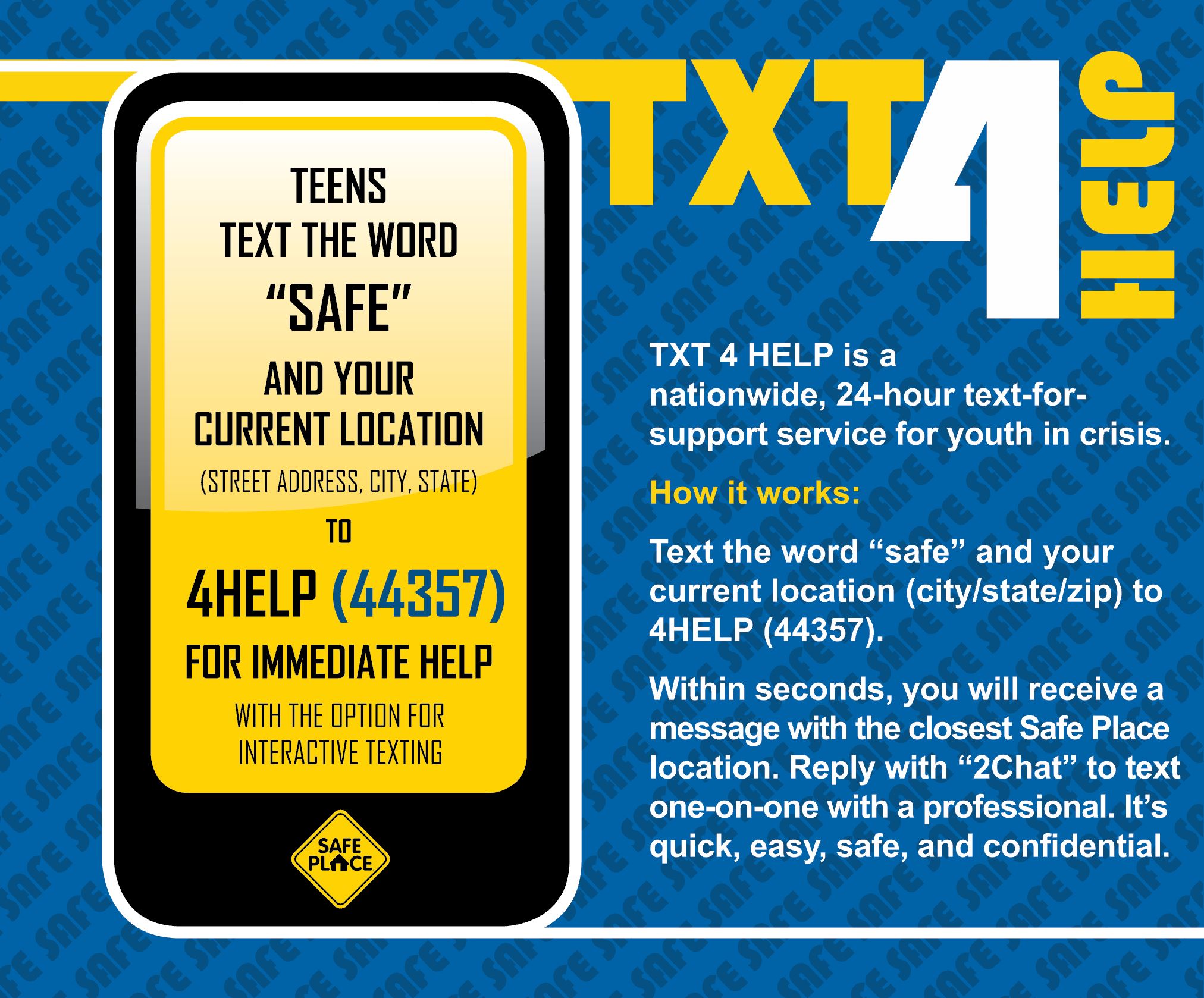
If you’re in trouble or need help, text SAFE and your current location (address/city/state) to 44357
TXT 4 HELP is a nationwide service offered by National Safe Place to help teens connect to the closest location where they can get immediate help and safety.
Here is how it works:
- If you’re in a crisis, text the word SAFE and your current location (address/city/state) to 44357
- We’ll text you back the address of the nearest Safe Place site and contact number for the local youth shelter. Within that same message you’ll receive a prompt that says, “reply with 2CHAT for more help.” Once you reply, you’ll be connected with a professional for more help.
TXT 4 HELP Interactive
Users can now text interactively with a Master’s level mental health professional for more help. The interactive service was launched on March 20, 2012. For school & community presentations contact our Safe Place Coordinator.
Jessica Brown, Safe Place & YSB Outreach Manager
Phone: 812-349-2043
Fax: 812-349-2892
jgbrown@co.monroe.in.us
*all services are provided without regard to race, age, color, religion, sex, sexual orientation, disability, national origin, ancestry, or status as a veteran.
You can also locate specific County Codes in the Document Center.
Our area can be affected by tornadoes and we want our community to be prepared as best they can in case the worst happens.
To stay safe during a tornado:
- Prepare a plan- For more guidance on how to create a plan, go to https://www.ready.gov/plan.
- Create an emergency kit- For more guidance on how to build your kit, go to https://www.ready.gov/kit.
- Stay aware of weather conditions during thunderstorms
- Know the best places to shelter both indoors and outdoors
- Always protect your head
We at the Monroe County Emergency Management Office strive to be quick and informative as possible when a tornado may strike. This is why we monitor our County Outdoor Warning Sirens daily to ensure quick notification. Make sure to sign up for our county Citizen Alerts for critical information when you need it most.
To be more informed about Tornadoes, go to https://www.ready.gov/tornadoes.
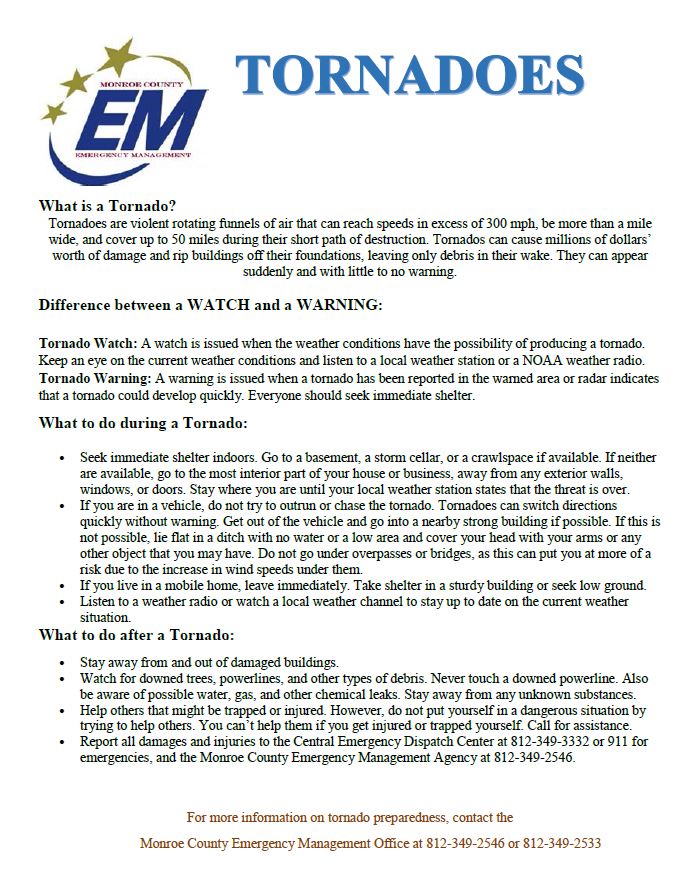
Guidance Documents
Please contact one of our Food Environmental Health Specialists for more information: ehsfoods@co.monroe.in.us or by phone: 812-349-2543, option 4. Office hours for staff are normally 8am to 9:30am Monday through Friday for walk-ins. We urge you to make an appointment prior to walking in as staff may be out of the office doing field work.
Public Health Preparedness
Monroe County Alert
Monroe County is offering a free service called Monroe County Alert. This system enables us to provide you with critical information quickly in a variety of situations, such as severe weather, unexpected road closures, missing persons and evacuations of buildings or neighborhoods.
You will receive time-sensitive messages wherever you specify, such as your home, mobile or business phone, email address, text messages and more. You pick where, you pick how.
Click the icon below to sign up.

Emergency Preparedness Education
If you would like to request Emergency Preparedness Education for your school, your child's school, or your community, please call our Public Health Coordinator at (812) 349-2849.
Additional Emergency Preparedness Resources
Indiana University Emergency Preparedness - Click Here
Food Safety During and After Emergencies - Click Here
NFPA Safety for Children Presented by Sparky the Fire Dog - http://www.sparky.org
Information on Planning and Preparing for Emergencies - http://www.fema.gov
Kid's Guide to Electrical Safety - https://www.saveonenergy.com/kids-electrical-safety-guide/
Through this website you are able to link to other websites which are not under the control of the Monroe County Health Department. We have no control over the nature, content and availability of those sites. The inclusion of any links does not necessarily imply a recommendation or endorse the views expressed within them, they are for informational purposes only.
- Recent
News - Useful
Links - Services
- Events























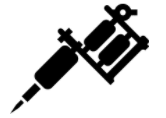



 Birth Certificates
Birth Certificates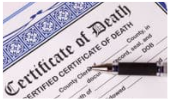


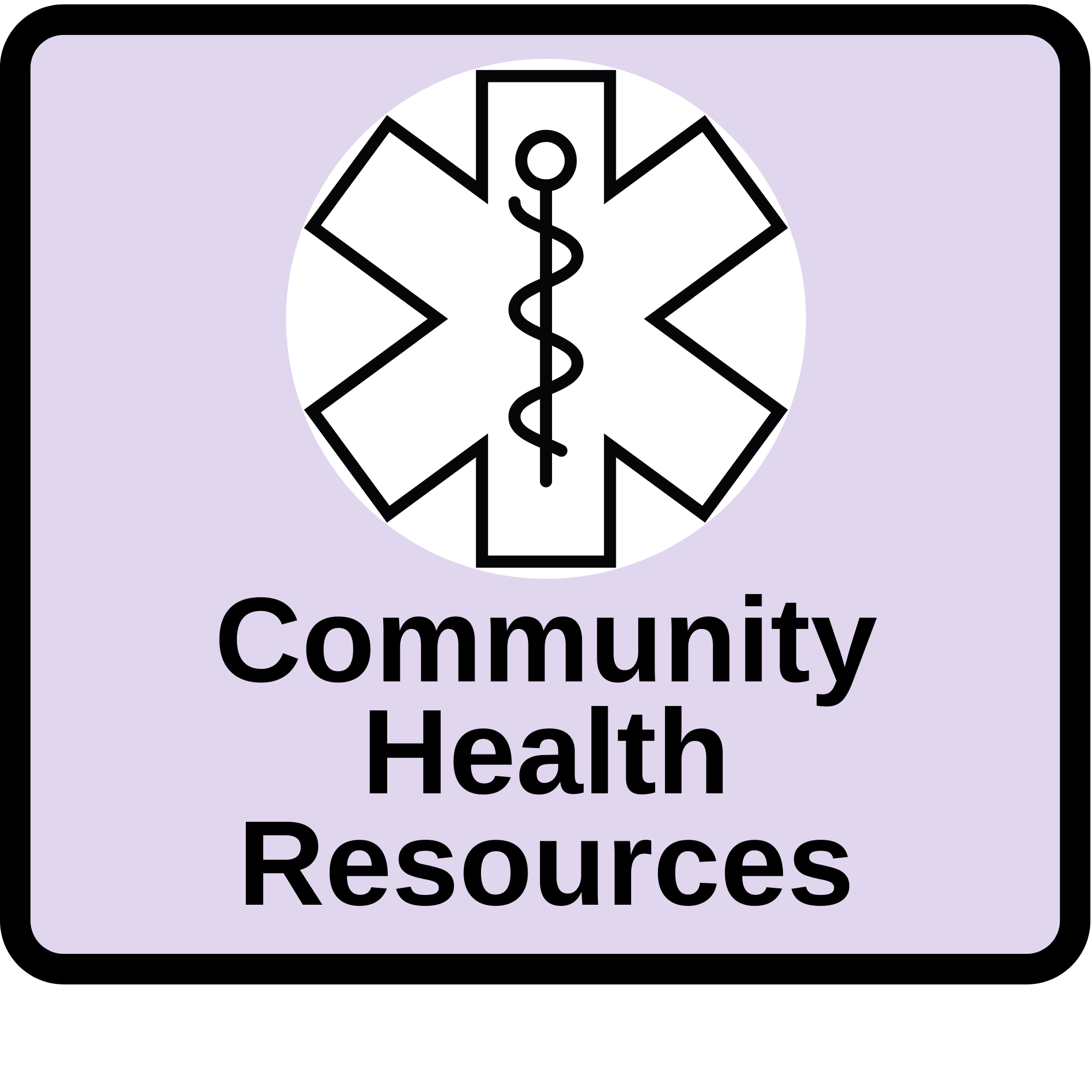
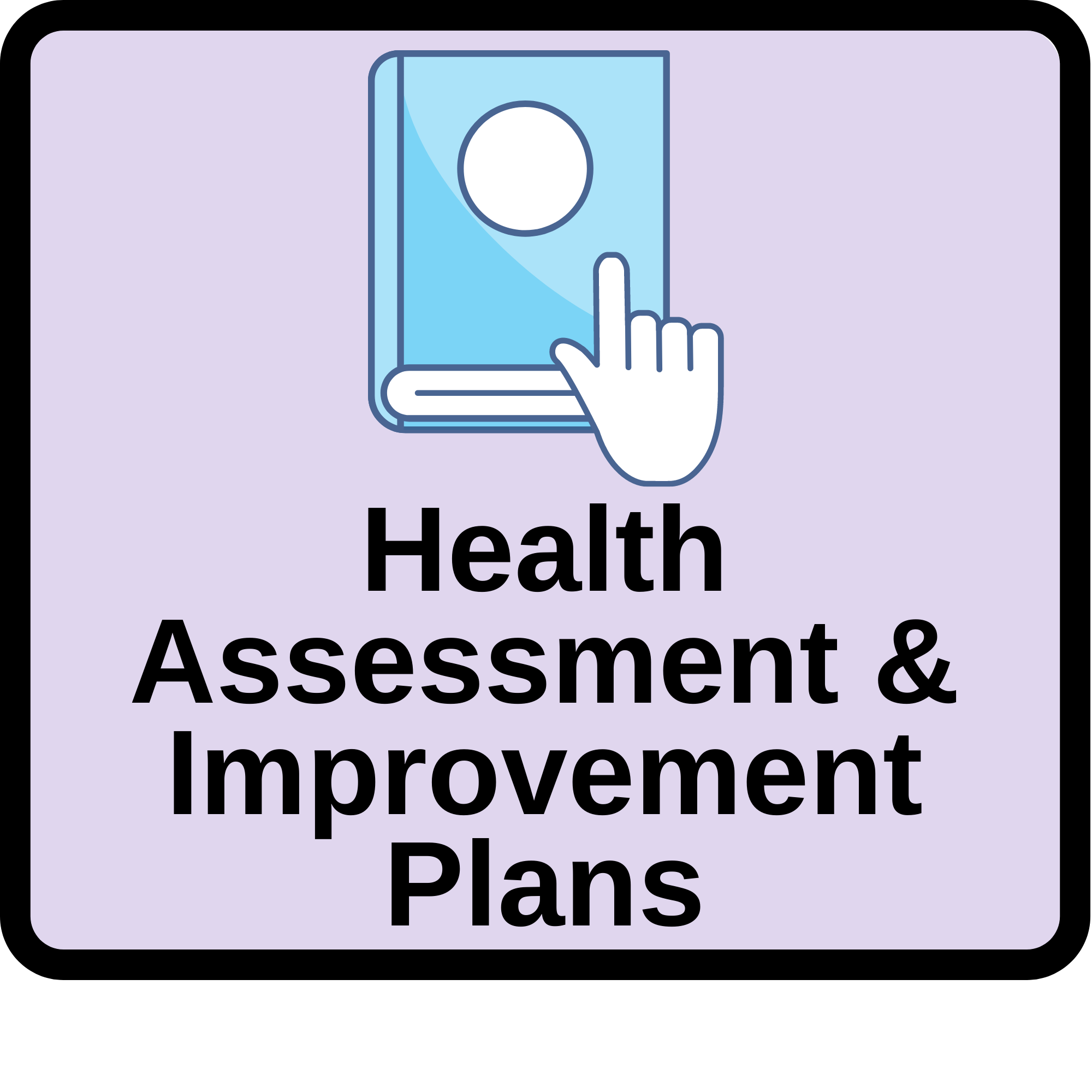
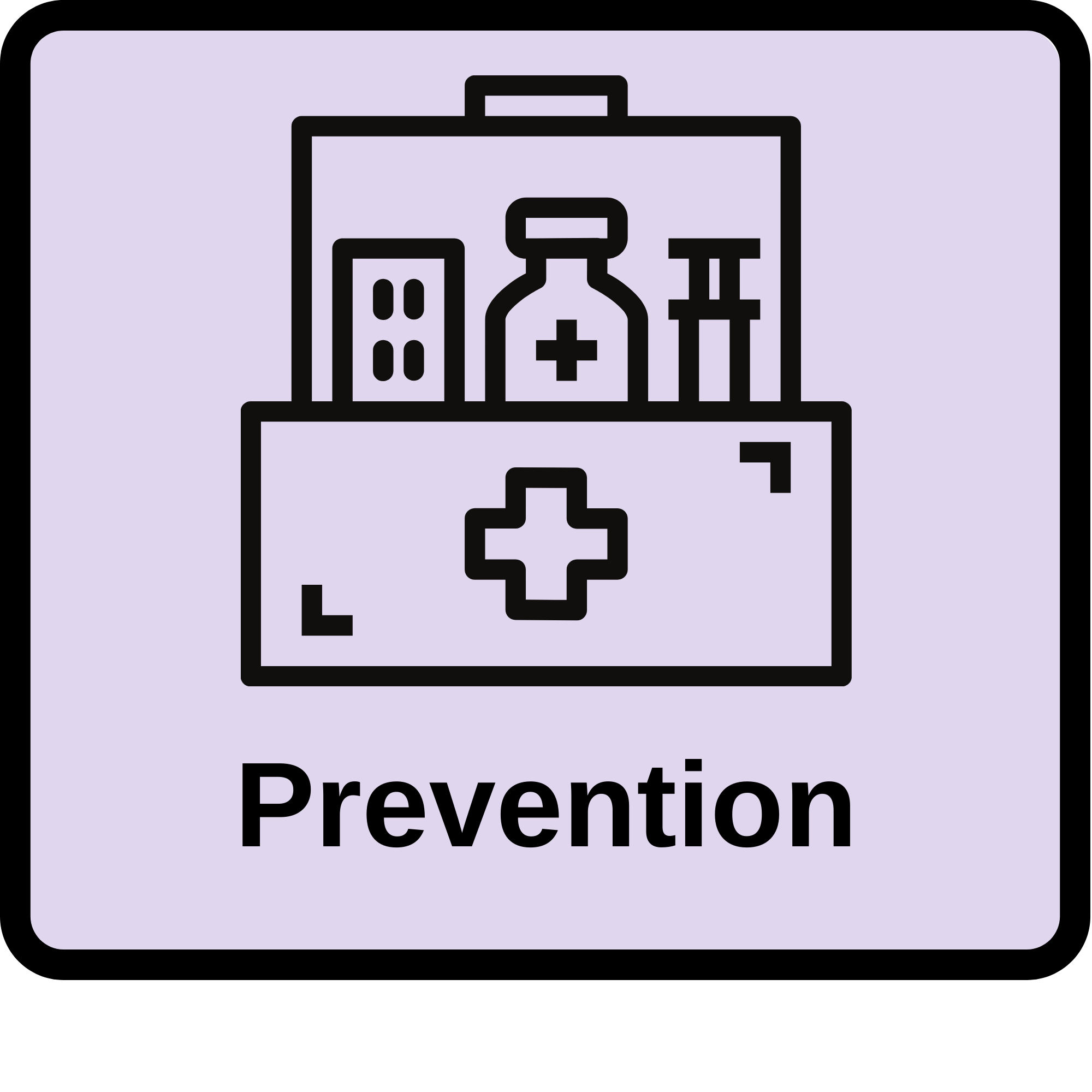
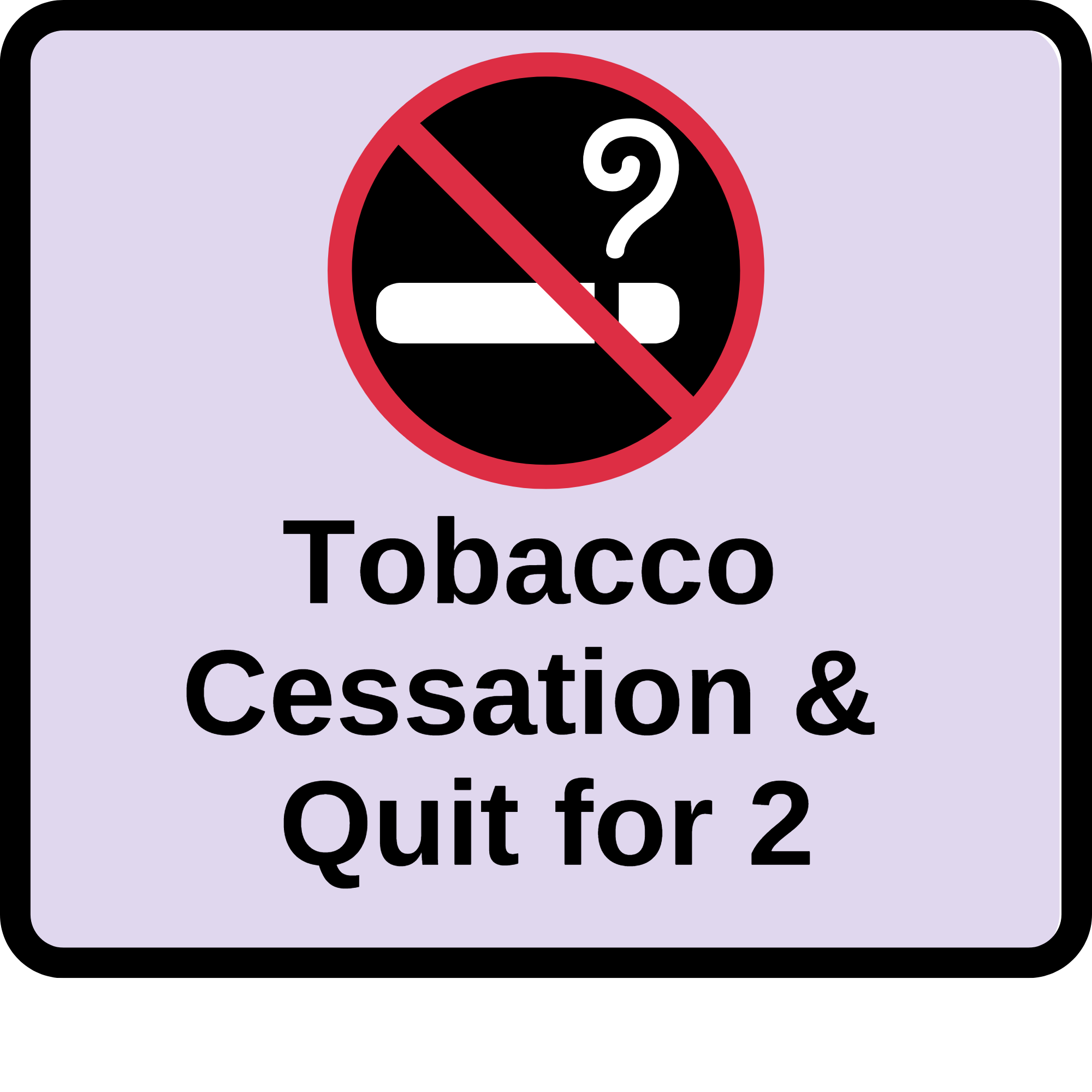
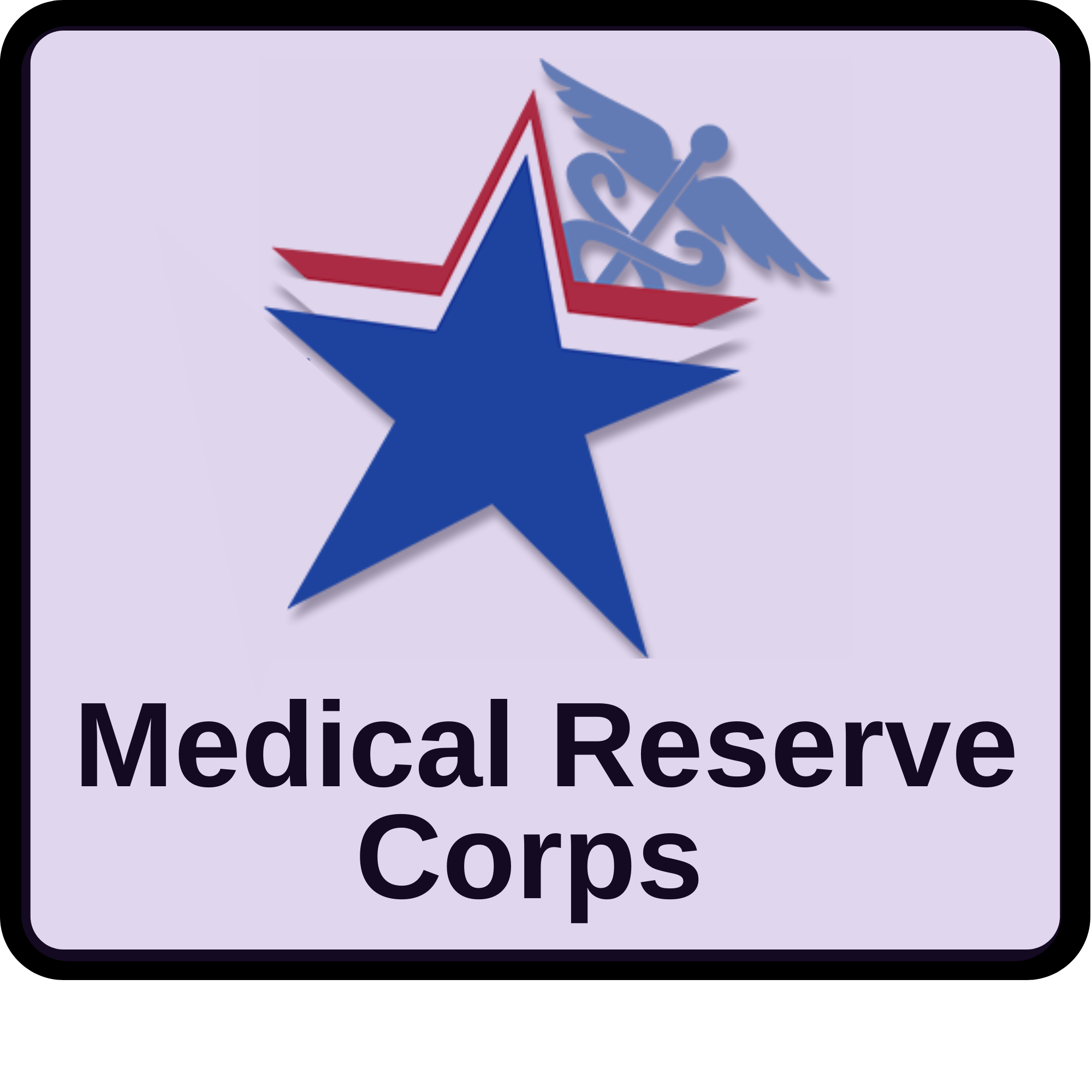





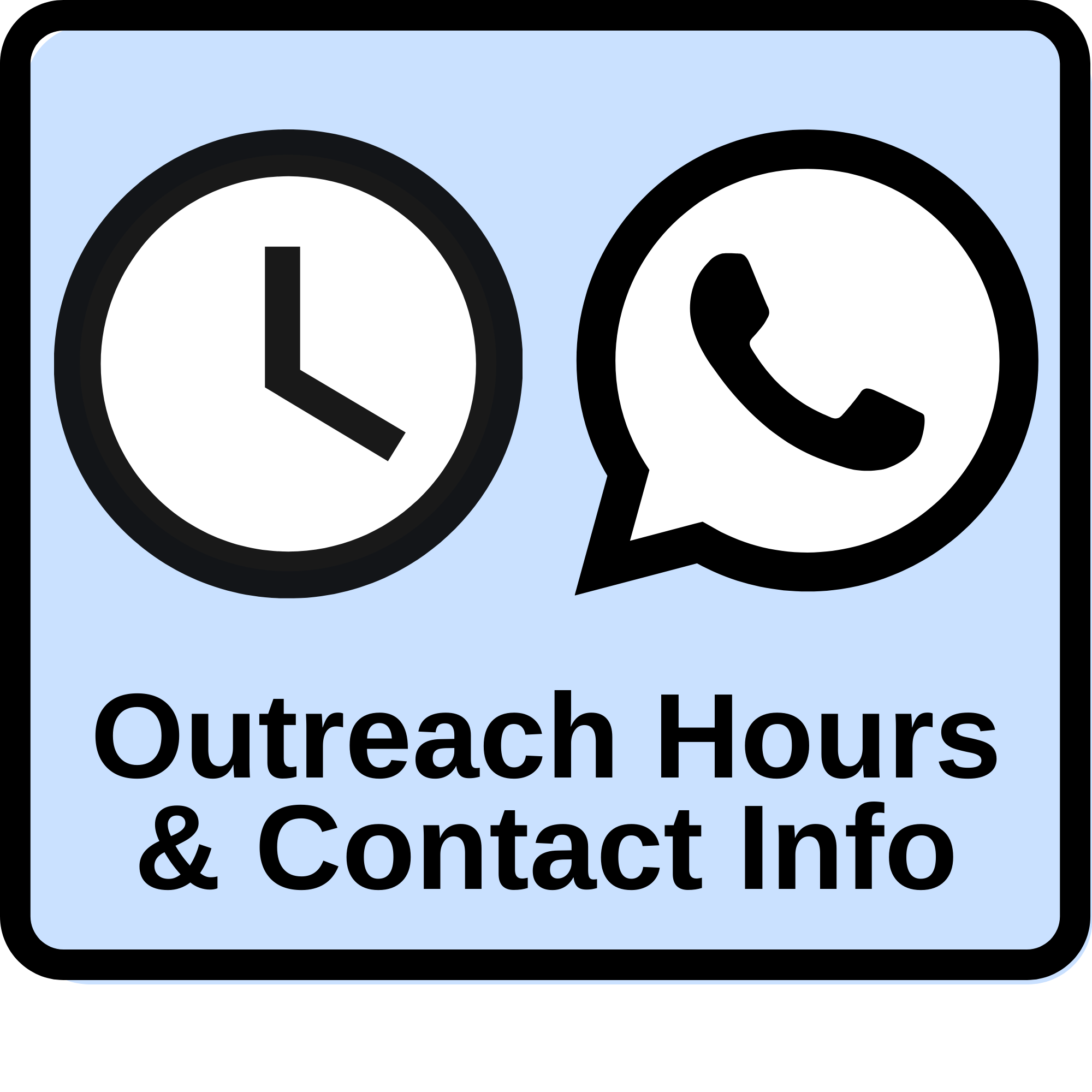
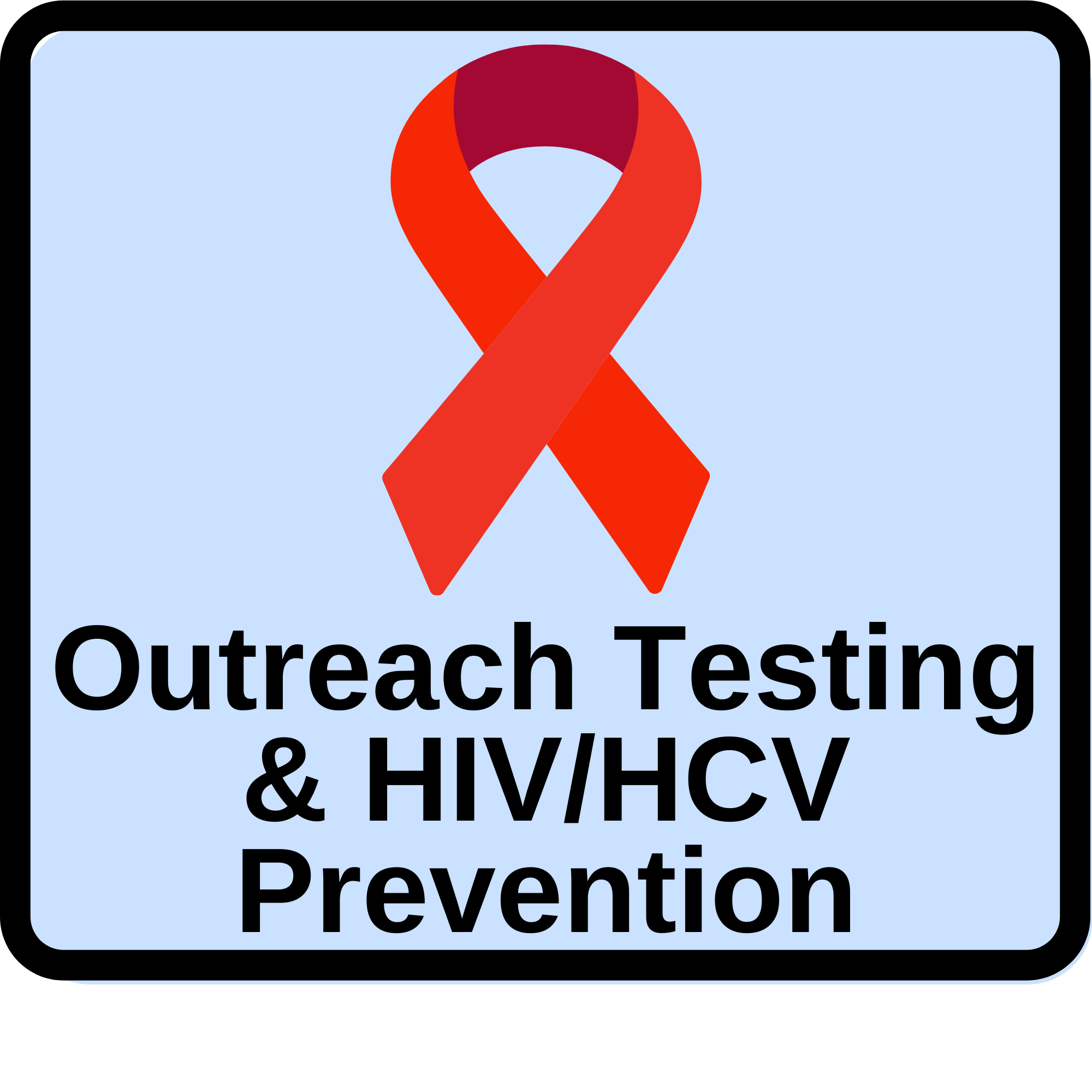
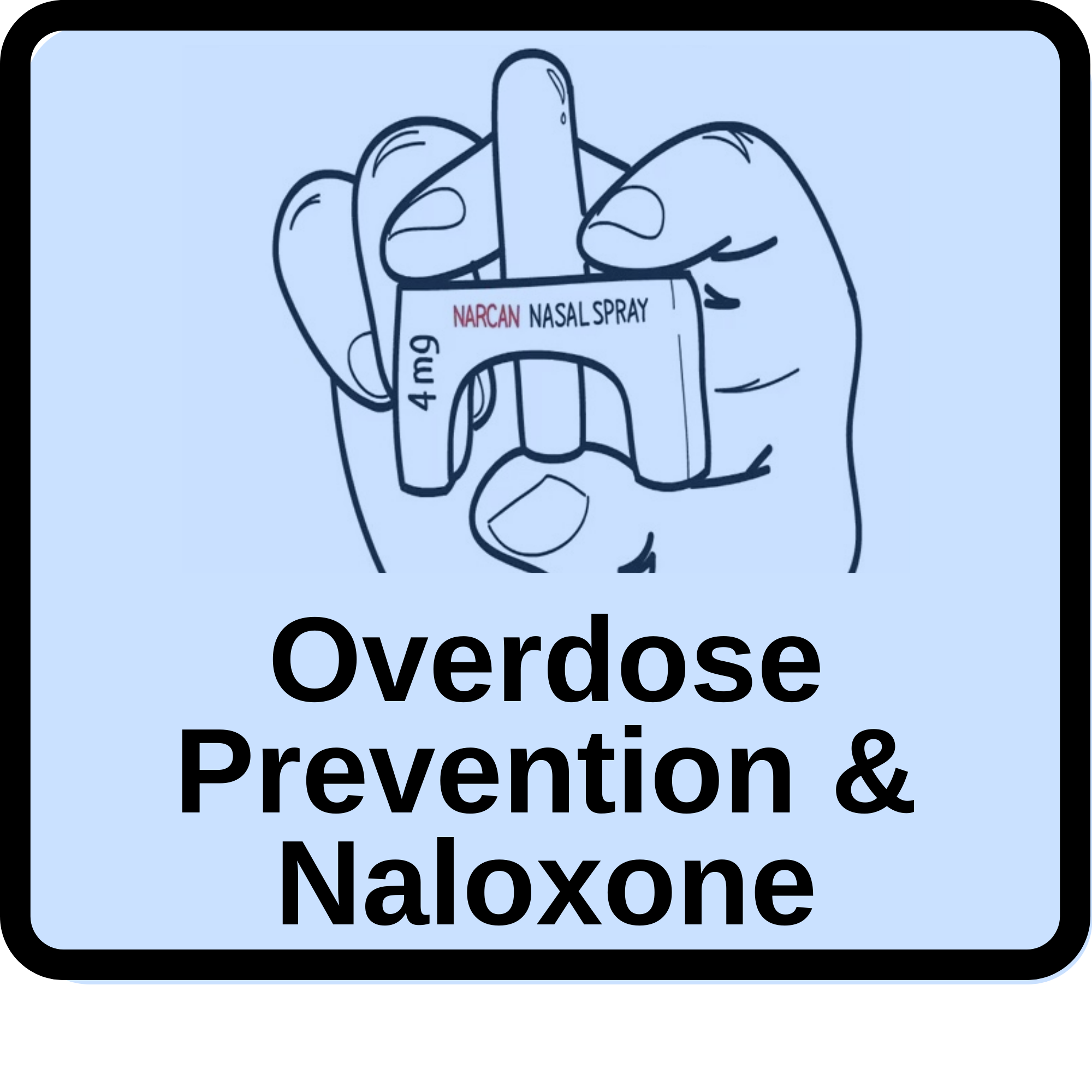
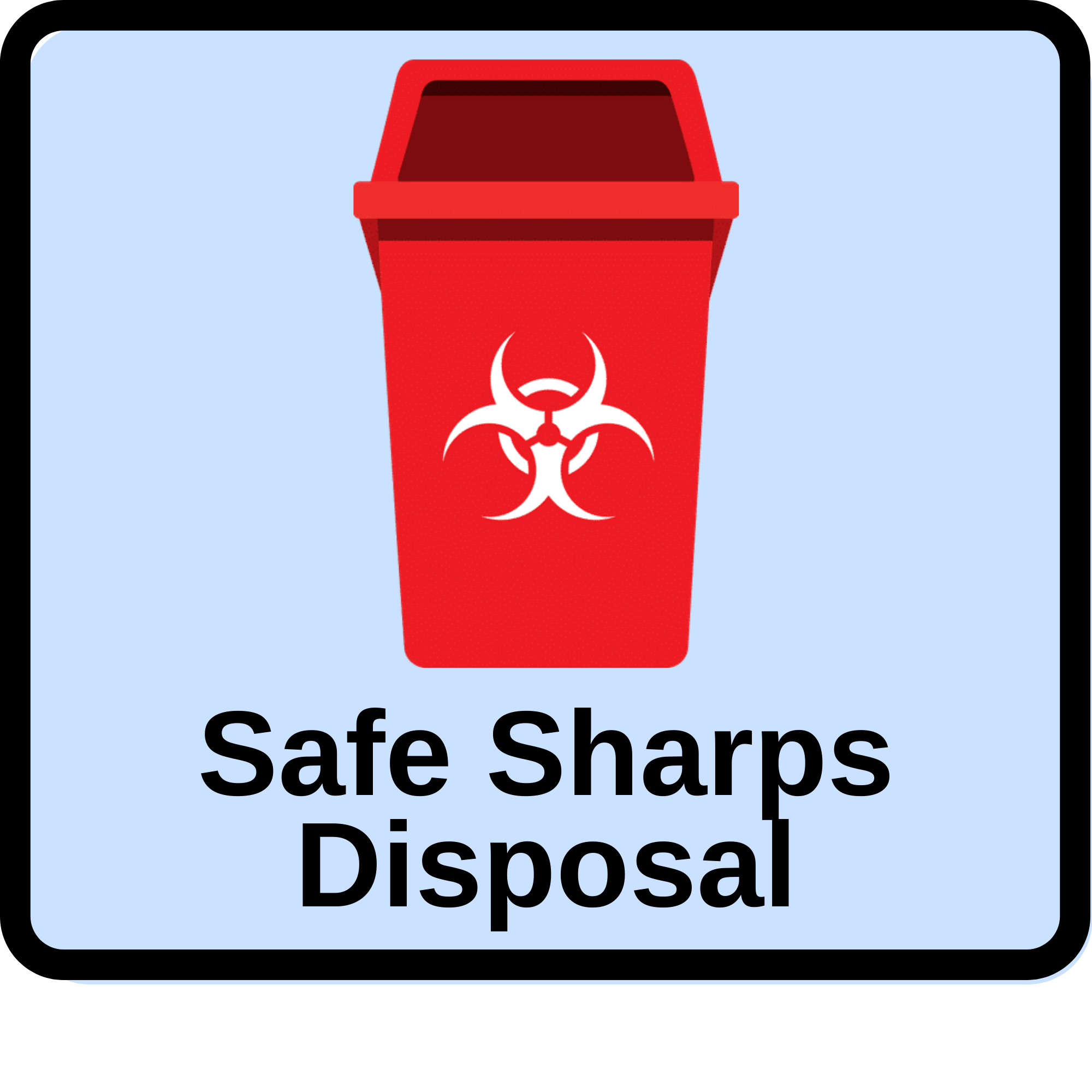
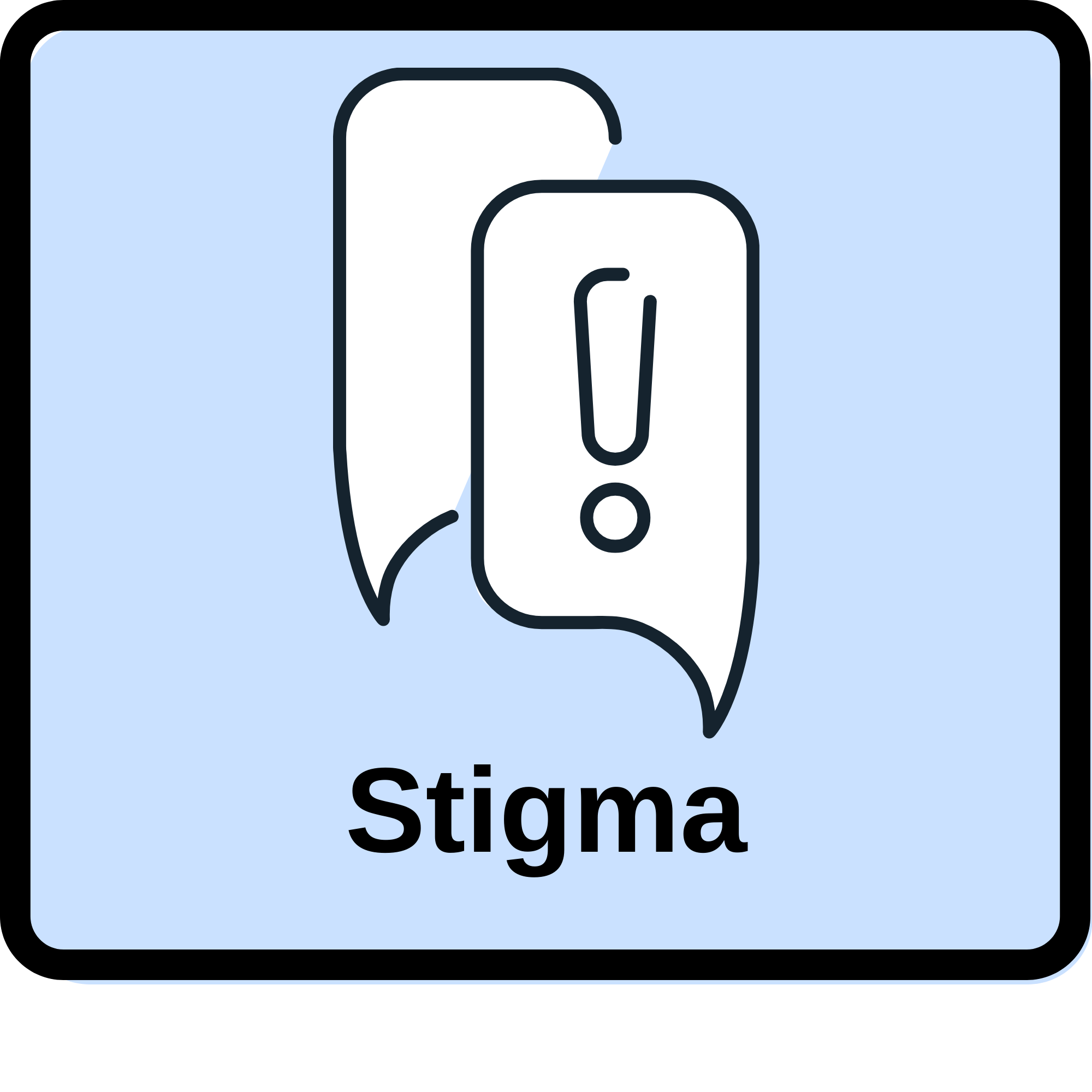
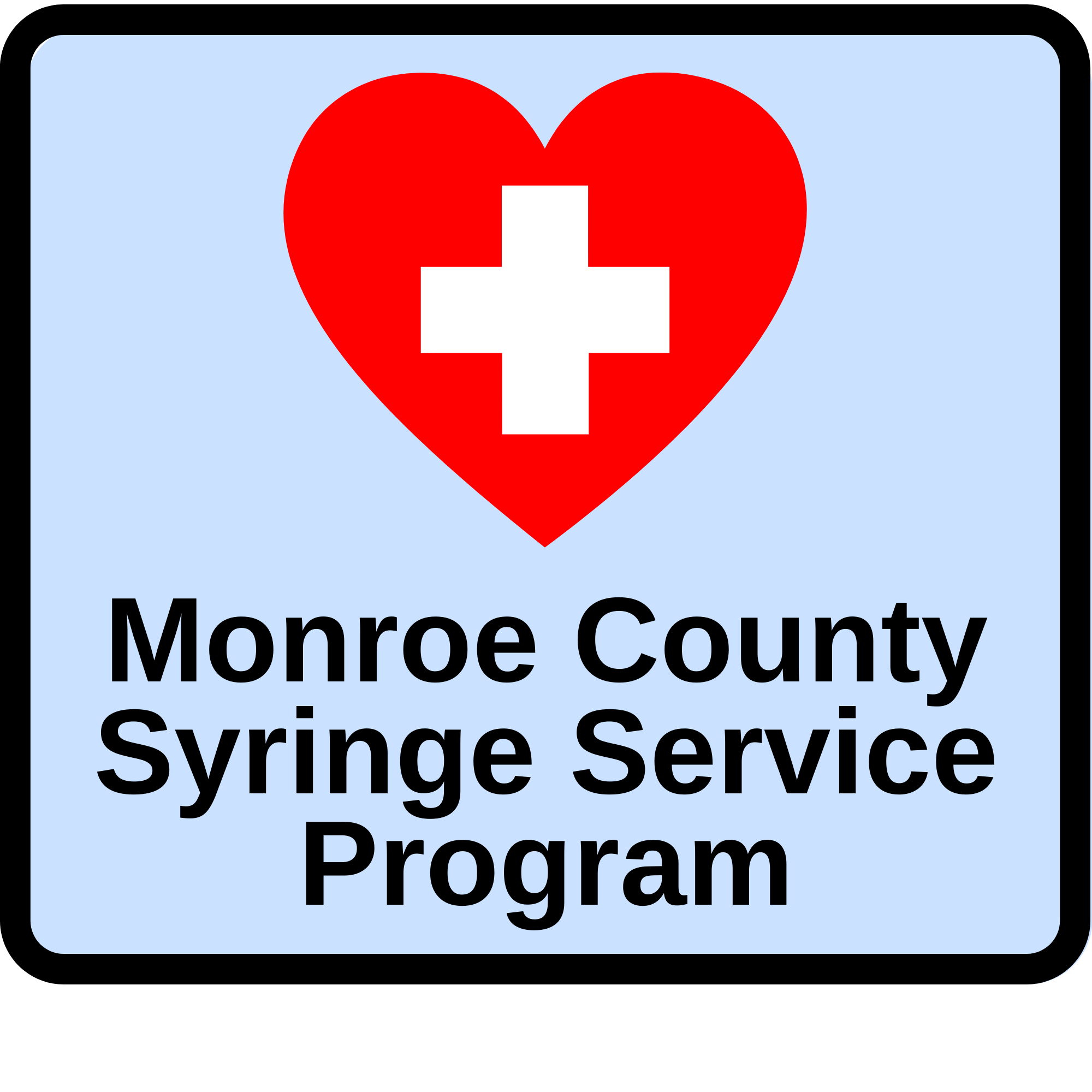


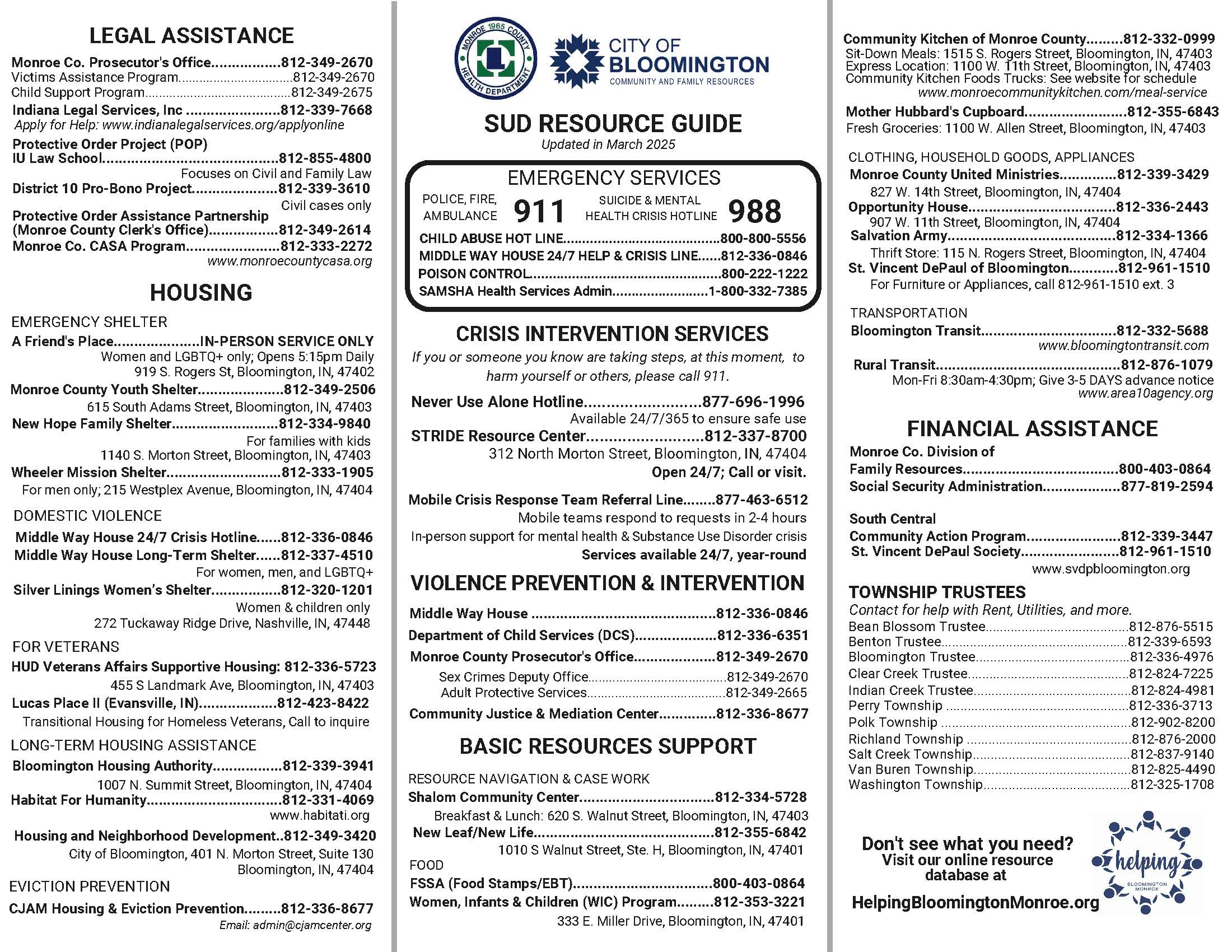
 Safe Place
Safe Place



